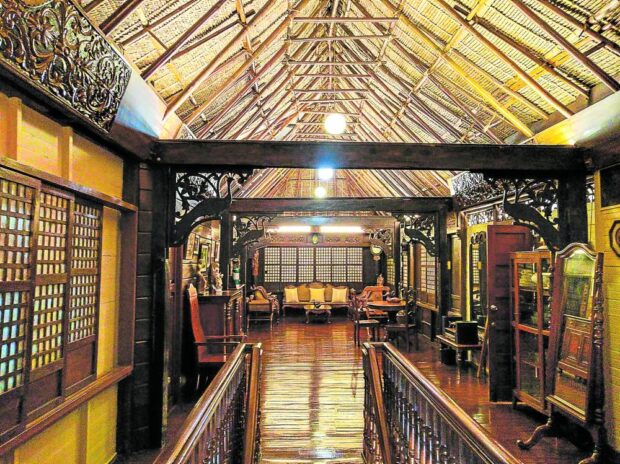
TRANSFORMATION | The single-room space that functioned as the sala and a bedroom for the David children is the only remnant of the 1900s Bale Pinaud. (Photo by MARIA ADELAIDA CALAYAG)
GUAGUA, Pampanga, Philippines — Across the grand Betis church here is Pedro S. David Street. It bears the name of a private lawyer-turned-prosecutor who swept the road while still in his pajamas.
The third house from the “dalang maragul” (national highway) was where David and his wife Bienvenida Siongco raised their seven boys and six girls.
“Strangers come to the house mistaking it for a museum,” Diocese of Kalookan Bishop Pablo Virgilio David, the 10th of the 13 siblings, said of Bale Pinaud (Kapampangan for nipa house), a nipa-roofed house built between 1900 and 1910 by his paternal great, great grandfather. It stands as the lone thatched-roof house along that street or in the old district of Betis.
Restored more than thrice after being hit by floods, Mt. Pinatubo’s lahar, and termite infestations, Bale Pinaud has remained a functional home to the David-Siongco clan that has grown to over 100 members.
Due to Mt. Pinatubo’s lahar that buried the “silong” on the ground floor in the 1990s, the
thatched-roof house’s upper floor is now on the same level as the elevated ground. (Photo from the book “BALE PINAUD”)
The structure’s endearing name became the title of a book about a family that preserves its tangible (the architecture and collections of the home) and intangible heritage (memories and values).
Launched at the Betis church’s museum on Nov. 19, the book is also called “a diary of family memories.”
Written by David and his brothers Randy (a sociologist), Nestor (an architect), and David (also known as Goli, an economist), the book comes with videos embedded in QR codes.
Nestor’s sketches of the house in different years provide a model for restoration or simply a documentation of a large nipa house later fitted with modern fixtures.
“We are rebuilding this home of our childhood so that we will never forget where and how we were formed. We want our children and grandchildren, whether they live here or abroad, not to forget where they came from,” Randy’s blurb stated.
He added: “We want them (children and grandchildren) to know that however far and wherever life may take them, there is always a place to which they can come home.”
Bale Pinaud as it is in 2023, featuring a concrete staircase (Photo by MARIA ADELAIDA CALAYAG)
READ: Pampanga potters keep tradition alive
READ: Hukbalahap monument unveiled in Pampanga
Tribute
The book, published by The Storytellers’ Society Inc., is considered rare. The genre tackling families is not too many in the country.
Several stories from the book were republished from Randy’s columns in the Philippine Daily Inquirer.
The book, the brothers said, is a tribute to their parents and to their brother-lawyer Dante who they regard as the “caretaker of our roots in Betis.” Dante succumbed to COVID-19.
“I hope it will inspire other Filipino families not only to treasure the heritage of their families and their homes, but also the spirit of bonding and affection that siblings have for one another,” said Randy.
Goli believed he was born last to serve as the “bridge to the next generations of nephews, nieces and grandchildren” because among his siblings, only he and the bishop maintained social media accounts.
Armed with values, the younger members of the clan can go prepared for their life journeys, he said.
Bale Pinaud book cover
Purpose
Randy said Goli was “very correct in saying that it is important for the next generations [in the clan] to know where they came from — not just physically but sociologically maybe, psychologically and spiritually — a particular tradition that a family held certain values sacred.”
“We made an effort not just to preserve the house but to preserve the values that are nurtured in the house. That’s the whole purpose of the book,” he explained.
Nina Tomen, the editor, said the idea of a family book was first discussed in 2016.
“The project resurfaced only during the pandemic when we were all kept in the confines of our homes,” she recalled, stressing that the result is a “heartfelt collection” of stories.
“Following our parents’ examples (Pedro’s incorruptibility, Bienvenida’s selflessness), we learned to adapt to the challenging environment,” wrote Nestor, the second son.
He added: “We never questioned the difficult situation we were in. We never internalized our deprivation of the usual home amenities. We felt no envy toward our high school classmates from wealthy families. We learned to confront reality without qualms.”
Randy paid respect to his father by writing: “Most of all, we have tried to live our father’s values — honesty, a good name, love of country and generosity.”
FAMILY TREASURE | The David brood minus their late brother, lawyer Dante, the “caretaker” of Bale Pinaud, during the book launch at Betis church’s museum in Guagua, Pampanga, on Nov. 19. The book “Bale Pinaud” is also a diary of memories of a clan guiding its younger generations
to journey in life with family and community in mind. (Photo by MARIA ADELAIDA CALAYAG)